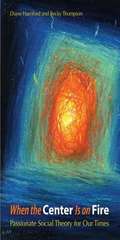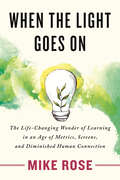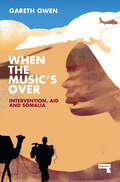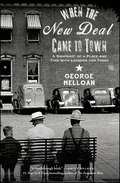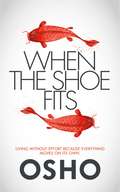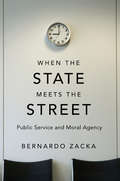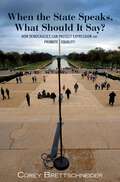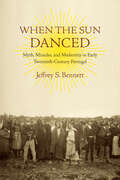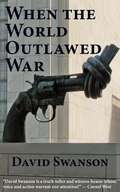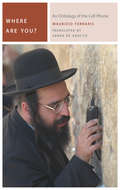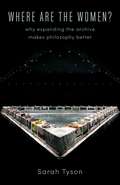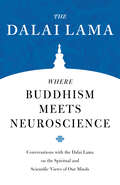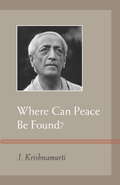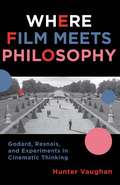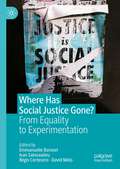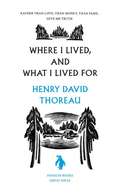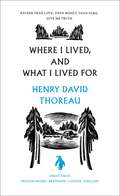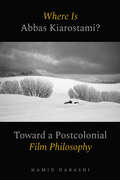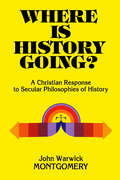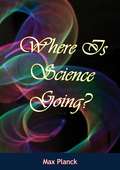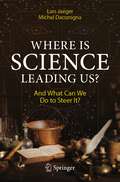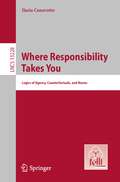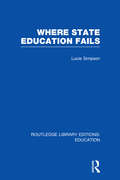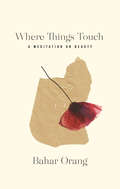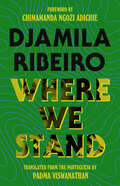- Table View
- List View
When the Center is on Fire
by Becky Thompson Diane HarrifordIn this lively and provocative book, two feminist public sociologists turn to classical social thinkers--W. E. B. Du Bois, Max Weber, Karl Marx, and Émile Durkheim--to understand a series of twenty-first century social traumas, including the massacre at Columbine High School, the 9/11 attacks, the torture at Abu Ghraib prison, and Hurricane Katrina. Each event was overwhelming in its own right, while the relentless pace at which they occurred made it nearly impossible to absorb and interpret them in any but the most superficial ways. Yet, each uncovered social problems that cry out for our understanding and remediation. In When the Center Is on Fire, Becky Thompson and Diane Harriford assert that classical social theorists grappled with the human condition in ways that remain profoundly relevant. They show, for example, that the loss of "double consciousness" that Du Bois identified in African Americans enabled political elites to turn a blind eye to the poverty and vulnerability of many of New Orleans's citizens. The authors' compelling, sometimes irreverent, often searing interpretations make this book essential reading.
When the Light Goes On: The Life-Changing Wonder of Learning in an Age of Metrics, Screens, and Diminish ed Human Connection
by Mike RoseThe final work from one of the most beloved voices in American education explores stories and lessons of transformative experiences in educationFor more than a generation, American education has been structured as though it was built of and for concepts, not people. This has transformed education into a vast assessment, scoring, and ranking enterprise; a sales platform for high-tech entrepreneurs; and a fiercely competitive arena of advantage and status that grinds the poor and propels the middle class into debt.In When the Light Goes On, educator Mike Rose features the stories of people of all ages and backgrounds to illuminate how education has added meaning to their lives. The inspiring stories include:-A supermarket checker whose job wore away his soul takes a remedial math class that starts him on a path toarchitecture school-A young man badly injured in a motorcycle accident finds both rehabilitation and a career in a welding program.-A transgender youth&’s odyssey to self-definition extends though courses in social sciences and campus advocacy groups.-A Native American athlete finds graduate study as a way to use her celebrity to articulate the needs of her people. When the Light Goes On helps us dig through the discord and fragmentation of school politics and policy to reclaim the mind and heart of education. Through various students&’ stories and his own, Rose provides an urgent reminder of the core purpose of education: to learn about ourselves and the world around us, to spark new interests, and to experience with guidance both the fulfillment and the uncertainty of exploring our limits—all in the service of creating a meaningful life.
When the Music's Over: Intervention, Aid and Somalia
by Gareth OwenA gritty and moving personal account of the struggle to provide humanitarian relief during Operation Restore Hope in war-torn Somalia.In 1993, Gareth Owen volunteered to go to Somalia with an Irish aid agency. Located in a remote desert outpost, he encountered the brutality of conflict and famine and experienced the hardships and struggles of an extraordinary race of desert warriors. He rubbed shoulders with the French Foreign Legion and Greek Special Forces and worked alongside a band of international aid workers striving to feed the Somali people. And as the country began to recover, he found himself losing connection with the Somalis as their resentment towards the international presence grew and violent confrontation erupted. In this accessible and engaging memoir, Owen, now Humanitarian Director at Save the Children UK, recounts the entanglement of violence and humanity at the heart of this notorious peacekeeping operation. This is a story of human resilience and contradictory friendships, of loyalty, courage and extraordinary endeavour — but mostly it is a story about the meaning of human connection in desperate circumstances. Part memoir, part history and part politics, When the Music's Over sees beyond the criticism of humanitarian intervention and challenges us to consider the enduring importance of international solidarity in a world where notions of common humanity and universal peace are increasingly being abandoned.
When the New Deal Came to Town: A Snapshot of a Place and Time with Lessons for Today
by George MelloanIt's A Wonderful Life meets New Deal or Raw Deal? in this personal and social history of the New Deal from a conservative point of view, detailing the effects on the economy, culture, and the people of small American town from longtime Wall Street Journal editor George Melloan.When the New Deal Came to Town is a snapshot of a time and place: Whiteland, Indiana during the Great Depression, one of the most fraught eras in American history. Imagine yourself transported back in time to April of 1933 and deposited in a small American town, when a young boy named George Melloan moved with his family to this quiet hamlet during the middle of the worst economic period in American history. Part social history, part personal observations, When the New Deal Came to Town provides a keen eyewitness account of how the Depression affected everyday lives and applies those experiences to the larger arena of American politics. Written with Melloan's signature "clarity and polemical skill" (The Washington Times), this is a fascinating narrative history that provides new insight into the Great Depression for a new generation.
When the Shoe Fits: Stories of the Taoist Mystic Chuang Tzu
by OshoThe powerful combination of the perennial wisdom of Tao and Osho's insightful and inspirational interpretation makes this a true gem of a book - which will appeal not only to Osho's numerous followers, but also to the increasing number of people who are interested in the wisdom of Tao. Although previously little known, this is one of Osho's classics. He brings his unique perception to the world of Tao, and offers his penetrating and illuminating comments on these original sutras. As always, his inspirational anecdotes and stories illustrate the points he makes - about the spiritual search, love, acceptance and true peace and happiness. With wonderfully irreverent humour, Osho sets out to pierce our disguises, shatter our illusions, cure our addictions and demonstrate the self-limiting and often tragic folly of taking ourselves too seriously.
When the State Meets the Street: Public Service and Moral Agency
by Bernardo ZackaBernardo Zacka probes the complex moral lives of street-level bureaucrats—the frontline social and welfare workers, police officers, and educators who represent government’s human face to ordinary citizens. Too often dismissed as soulless operators, these workers wield significant discretion and make decisions that profoundly affect people’s lives.
When the State Speaks, What Should It Say?: How Democracies Can Protect Expression and Promote Equality
by Corey BrettschneiderHow should a liberal democracy respond to hate groups and others that oppose the ideal of free and equal citizenship? The democratic state faces the hard choice of either protecting the rights of hate groups and allowing their views to spread, or banning their views and violating citizens' rights to freedoms of expression, association, and religion. Avoiding the familiar yet problematic responses to these issues, political theorist Corey Brettschneider proposes a new approach called value democracy. The theory of value democracy argues that the state should protect the right to express illiberal beliefs, but the state should also engage in democratic persuasion when it speaks through its various expressive capacities: publicly criticizing, and giving reasons to reject, hate-based or other discriminatory viewpoints. Distinguishing between two kinds of state action--expressive and coercive--Brettschneider contends that public criticism of viewpoints advocating discrimination based on race, gender, or sexual orientation should be pursued through the state's expressive capacities as speaker, educator, and spender. When the state uses its expressive capacities to promote the values of free and equal citizenship, it engages in democratic persuasion. By using democratic persuasion, the state can both respect rights and counter hateful or discriminatory viewpoints. Brettschneider extends this analysis from freedom of expression to the freedoms of religion and association, and he shows that value democracy can uphold the protection of these freedoms while promoting equality for all citizens.
When the Sun Danced: Myth, Miracles, and Modernity in Early Twentieth-Century Portugal (Studies in Religion and Culture)
by Jeffrey S. BennettBetween May and October of 1917, three young shepherds were reportedly visited six times by an apparition of the Virgin Mary near the town of Fátima in Portugal. At the final apparition event, approximately 70,000 visitors gathered to witness a prophesied miracle intended to convince the public that the children’s visions were of divine origin. The miracle took the form of a solar anomaly; witnesses claimed that the sun began to "dance." Exploring the early development of the cult of the Virgin of Fátima and the overthrow of the liberal, secular government by pro-Catholic elements, Jeffrey Bennett offers the first book-length scholarly study of the cult’s relationship to the rise of authoritarian politics in Portugal. When the Sun Danced offers a fascinating look at the cultural dynamics that informed one of the most turbulent periods in the nation’s history.
When the World Outlawed War
by David SwansonThis is a masterful account of how people in the United States and around the world worked to abolish war as a legitimate act of state policy and won in 1928, outlawing war with a treaty that is still on the books. Swanson's account of the successful work of those who came before us to insist that war be outlawed points us toward new ways of thinking about both war and political activism.
Where Are You?: An Ontology of the Cell Phone (Commonalities)
by Maurizio FerrarisThis book sheds light on the most philosophically interesting of contemporary objects: the cell phone. “Where are you?”—a question asked over cell phones myriad times each day—is arguably the most philosophical question of our age, given the transformation of presence the cell phone has wrought in contemporary social life and public space.Throughout all public spaces, cell phones are now a ubiquitous prosthesis of what Descartes and Hegel once considered the absolute tool: the hand. Their power comes in part from their ability to move about with us—they are like a computer, but we can carry them with us at all times—in part from what they attach to us (and how), as all that computational and connective power becomes both handy and hand-sized.Quite surprisingly, despite their name, one might argue, as Ferraris does, that cell phones are not really all that good for sound and speaking. Instead, the main philosophical point of this book is that mobile phones have come into their own as writing machines—they function best for text messages, e-mail, and archives of allkinds. Their philosophical urgency lies in the manner in which they carry us from the effects of voice over into reliance upon the written traces that are, Ferraris argues, the basic stuff of human culture.Ontology is the study of what there is, and what there is in our age is a huge network of documents, papers, and texts of all kinds. Social reality is not constructed by collective intentionality; rather, it is made up of inscribed acts. As Derrida already prophesized, our world revolves around writing. Cell phones have attached writing to our fingers and dragged it into public spaces in a new way. This is why, with their power to obliterate or morph presence and replace voice with writing, the cell phone is such a philosophically interesting object.
Where Are the Women?: Why Expanding the Archive Makes Philosophy Better
by Sarah TysonPhilosophy has not just excluded women. It has also been shaped by the exclusion of women. As the field grapples with the reality that sexism is a central problem not just for the demographics of the field but also for how philosophy is practiced, many philosophers have begun to rethink the canon. Yet attempts to broaden European and Anglophone philosophy to include more women in the discipline’s history or to acknowledge alternative traditions will not suffice as long as exclusionary norms remain in place.In Where Are the Women?, Sarah Tyson makes a powerful case for how redressing women’s exclusion can make philosophy better. She argues that engagements with historical thinkers typically afforded little authority can transform the field, outlining strategies based on the work of three influential theorists: Genevieve Lloyd, Luce Irigaray, and Michèle Le Doeuff. Following from the possibilities they open up, at once literary, linguistic, psychological, and political, Tyson reclaims two passionate nineteenth-century texts—the Declaration of Sentiments from the 1848 Seneca Falls Convention and Sojourner Truth’s speech at the 1851 Akron, Ohio, Women’s Convention—showing how the demands for equality, rights, and recognition sought in the early women’s movement still pose quandaries for contemporary philosophy, feminism, and politics. Where Are the Women? challenges us to confront the reality that women’s exclusion from philosophy has been an ongoing project and to become more critical both of how we see existing injustices and of how we address them.
Where Buddhism Meets Neuroscience: Conversations with the Dalai Lama on the Spiritual and Scientific Views of Our Minds (Core Teachings of Dalai Lama #6)
by The Dalai LamaThis book, designed as a conversation between the Dalai Lama and Western neuroscientists, takes readers on a journey through opposing fields of thought--showing that they may not be so opposing after all.Is the mind an ephemeral side effect of the brain’s physical processes? Are there forms of consciousness so subtle that science has not yet identified them? How does consciousness happen? Organized by the Mind and Life Institute, this discussion addresses some of the most troublesome questions that have driven a wedge between Western science and religion. Edited by Zara Houshmand, Robert B. Livingston, and B. Alan Wallace, Where Buddhism Meets Neuroscience is the culmination of meetings between the Dalai Lama and a group of eminent neuroscientists and psychiatrists. The Dalai Lama’s incisive, open-minded approach both challenges and offers inspiration to Western scientists. This book was previously published under the title Consciousness at the Crossroads.
Where Can Peace Be Found?
by J. KrishnamurtiWidely recognized as one of the most influential spiritual teachers of the twentieth century, Jiddu Krishnamurti taught that in order for there to be peace in the world, we must each first make peace with ourselves. No spiritual path, leader, or personal or political philosophy will guide us in this endeavor, he said; this transformation of the human psyche is a truth that each of us must discover within. Here, Krishnamurti teaches that the war and destruction human beings wreak on each other and the environment are caused by our misplaced attachment to a sense of self and individuality that leads to aggression, competition, greed, and conflict. When we recognize that our consciousness is not individual but common to all humans, we can work together in a spirit of cooperation and compassion. Krishnamurti shows that taking personal responsibility for our actions and reactions—in our relationships and in our lives—is the necessary first step toward a global view
Where Film Meets Philosophy: Godard, Resnais, and Experiments in Cinematic Thinking (Film and Culture Series)
by Hunter VaughanHunter Vaughan interweaves phenomenology and semiotics to analyze cinema's ability to challenge conventional modes of thought. Merging Maurice Merleau-Ponty's phenomenology of perception with Gilles Deleuze's image-philosophy, Vaughan applies a rich theoretical framework to a comparative analysis of Jean-Luc Godard's films, which critique the audio-visual illusion of empirical observation (objectivity), and the cinema of Alain Resnais, in which the sound-image generates innovative portrayals of individual experience (subjectivity). Both filmmakers radically upend conventional film practices and challenge philosophical traditions to alter our understanding of the self, the world, and the relationship between the two. Films discussed in detail include Godard's Vivre sa vie (1962), Contempt (1963), and 2 or 3 Things I Know About Her (1967); and Resnais's Hiroshima, mon amour (1959), Last Year at Marienbad (1961), and The War Is Over (1966). Situating the formative works of these filmmakers within a broader philosophical context, Vaughan pioneers a phenomenological film semiotics linking two disparate methodologies to the mirrored achievements of two seemingly irreconcilable artists.
Where Has Social Justice Gone?: From Equality to Experimentation
by Emmanuelle Barozet Ivan Sainsaulieu Régis Cortesero David MéloThis book uses survey data in "hot spots" around the globe, to analyse various models of social justice, particularly the principle of equality, from a pragmatic perspective. Starting with ordinary actors, social movements, and concrete contexts, the authors question foundations of social and political democracy in our times. They focus on how social actors deal with the principles of justice and judgments of justice at work and in their social lives. The book suggests that the increase in social inequalities in recent decades contrasts with the blurring of the aims of social justice. At a time when the reconsideration of politics largely depends on its relevance to and aspirations for social justice, the authors of this book question contemporary developments by illustrating its variety, according to specific historical, institutional, social and organizational contexts.The book will be useful to students and scholars in the social sciences, especially those interested in moral questions regarding social justice, from an empirical and practical point of view.
Where I Lived, and What I Lived For (Penguin Books - Great Ideas)
by Henry David ThoreauThoreau's account of his solitary and self-sufficient home in the New England woods remains an inspiration to the environmental movement--a call to his fellow men to abandon their striving, materialistic existences of 'quiet desperation' for a simple life within their means, finding spiritual truth through awareness of the sheer beauty of their surroundings.
Where I Lived, and What I Lived For (Penguin Great Ideas)
by Henry ThoreauThroughout history, some books have changed the world. They have transformed the way we see ourselves - and each other. They have inspired debate, dissent, war and revolution. They have enlightened, outraged, provoked and comforted. They have enriched lives - and destroyed them. Now Penguin brings you the works of the great thinkers, pioneers, radicals and visionaries whose ideas shook civilization and helped make us who we are.Thoreau's account of his solitary and self-sufficient home in the New England woods remains an inspiration to the environmental movement - a call to his fellow men to abandon their striving, materialistic existences of 'quiet desperation' for a simple life within their means, finding spiritual truth through awareness of the sheer beauty of their surroundings.
Where Is Abbas Kiarostami?: Toward a Postcolonial Film-Philosophy
by Hamid DabashiWhen Abbas Kiarostami suddenly passed away in July 2016, he was already an iconic figure in world cinema—and his reputation as a master filmmaker has only grown since. In this book, celebrated scholar Hamid Dabashi offers a new way of looking at Kiarostami's artworld, one that questions the very idea of film philosophy. Dabashi's authoritative account of the philosophical resonances of Kiarostami's oeuvre offers an iconoclastic critique of the field's Eurocentrism and, in vivid prose, makes the case for a new method of appreciating the work of this essential figure. The result is a provocative perspective on the totality of Kiarostami's legacy that, with deep roots in Iranian aesthetic and Persian poetic and philosophical traditions, overcomes film's provincial preoccupation with its Western heritage and charts a new path forward for film-philosophy.
Where Is History Going?: A Christian Response to Secular Philosophies of History
by John Warwick MontgomeryIn a closely reasoned, logical presentation, Dr. Montgomery examines such issues as: Where is History Going? / What Does a Historian Know About Jesus Christ? / The Divinity of Jesus Christ / Karl Barth and Contemporary Theology of History / Tillich's Philosophy of History / Gordon Clark's Historical Philosophy / Toward a Christian Philosophy of History. Dr. Montgomery thoroughly documents his conclusions on the basis of a wide range of authorities, and concludes that the only valid approach to history is from the Christian perspective - the authority of God, His Son, and His Word.
Where Is Science Going?
by Albert Einstein Max Planck James MurphyFirst published in 1932, this book by Nobel Prize-winning German physicist Max Planck, a profound humanist as well as a theoretical scientist and professor in Germany between the two World Wars, provides the reader with a great insider’s look at how scientific revolutions unfold from the first sparks of ingenuity to their establishment as accepted paradigms of their current times.
Where Is Science Leading Us?: And What Can We Do to Steer It?
by Lars Jaeger Michel DacorognaThis book charts the evolution of the sciences and technologies that have shaped our modern age like nothing else in the last 60 years. As well as describing many exciting developments, it will also highlight the challenges and dangers of the technologies that have emerged from them. While science and technology have brought about enormous and often astonishing improvements in our quality of life, they have often also brought with them considerable risks, including the risk of human extinction. We place particular emphasis on the aspects that directly impact us as human beings: Artificial Intelligence (AI), enhancements of our brains/minds through innovative neuro-technologies, and the integration of nanotechnology into our bodies for early disease detection and elimination. What philosophical implications arise from these transformations? Authored by two theoretical physicists who are also experts in economics and capital markets - a rather rare combination - the book will explain the developments of modern science and the resulting technologies. It also examines the current state of play and emerging developments in a manner accessible to non-scientists. Based on their own experience and the analysis, the authors also propose ways in which science can progress more harmoniously in future.
Where Responsibility Takes You: Logics of Agency, Counterfactuals, and Norms (Lecture Notes in Computer Science #13228)
by Ilaria CanavottoThis book presents the Ph.D. dissertation of Ilaria Canavotto. The thesis won the E.W. Beth Dissertation Prize in 2021 for outstanding dissertations in the fields of logic, language, and information. It combines modal logics of agency, counterfactuals, and norms in order to study the reasoning underlying ascriptions of causal responsibility, the responsibility an agent is subject to because of the states of affairs they have brought about. Ascriptions of causal responsibility involve both causal reasoning and normative reasoning. In order to provide a logical analysis of these components, the dissertation brings together two mainstream logics of actions, STIT (seeing to it that) logic and Propositional Dynamic Logic, and extends them with an analysis of causality, a Lewis-Stalnaker style analysis of counterfactuals, subject matter semantics, and deontic logic. The author uses the resulting logics to investigate a number of philosophical issues underlying ascriptions of causal responsibility and technical issues emerging from the unification of the above-mentioned formal frameworks.
Where State Education Fails (Routledge Library Editions: Education)
by Lucie SimpsonDespite being published in the early part of the twentieth century many of the issues this volume discusses are still being debated in education today. The author maintains that state education is not functioning as it should – that the output is not commensurate with the outlay, that education has become too narrow in its focus and that more importance should be given to the teaching of younger children. The balance between a traditional academic education versus the skills needed for practical trades is also discussed, as is the disparity between the types of education available to rich and poor.
Where Things Touch: A Meditation on Beauty (Essais Ser. #10)
by Bahar OrangTo devote oneself to the study of beauty is to offer footnotes to the universe for all the places and all the moments that one observes beauty. I can no longer grab beauty by her wrists and demand articulation or meaning. I can only take account of where things touch.Part lyric essay, part prose poetry, Where Things Touch grapples with the manifold meanings and possibilities of beauty.Drawing on her experiences as a physician-in-training, Orang considers clinical encounters and how they relate to the concept and very idea of beauty. Such considerations lead her to questions about intimacy, queerness, home, memory, love, and other aspects of human existence. Throughout, beauty is ultimately imagined as something inextricably tied to care: the care of lovers, of patients, of art and literature, and the various non-human worlds that surround us.Eloquent and meditative in its approach, beauty, here, beyond base expectations of frivolity and superficiality, is conceived of as a thing to recover. Where Things Touch is an exploration of an essential human pleasure, a necessary freedom by which to challenge what we know of ourselves and the world we inhabit.
Where We Stand (The Margellos World Republic of Letters)
by Djamila RibeiroThe instant bestseller from Djamila Ribeiro that sparked a major Black feminist movement in Brazil In a society shaped by the legacies of enslavement, white supremacy, and sexism, who has the right to a voice? In this elegant essay, Djamila Ribeiro offers a compelling intervention into contemporary discussions of power and identity: the concept of &“speaking place.&” A crucial component of conversations on race and gender in Brazil, speaking place is the idea that everyone has a social position in the world and that what we are able to say, and how it is received by others, depends on it. Ribeiro traces the history of Black feminist thought through several centuries, examining the ways that Black women have been silenced, ignored, and punished for speaking. Building on feminist standpoint theory, and in conversation with the works of Sojourner Truth, bell hooks, Audre Lorde, and others, Ribeiro invites all of us to recognize where we stand, to imagine geographies different from those we&’ve inherited, and to speak a more humane world into being.
